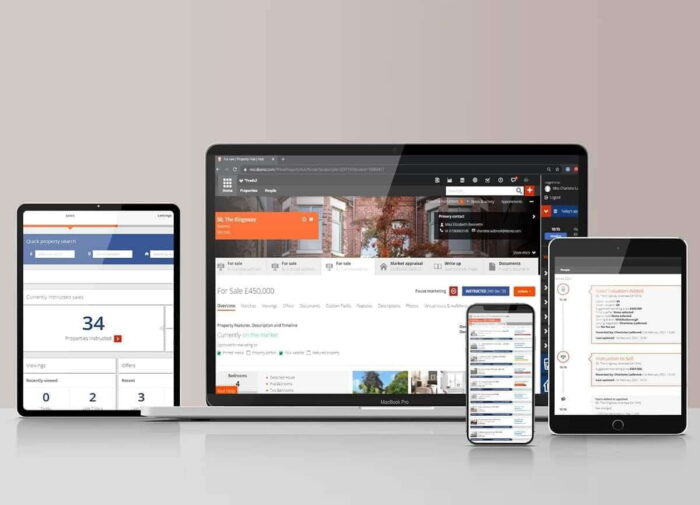
Real estate software is one of the more relevant directions today. There are a lot of people and companies that need software solutions to manage properties from different angles – from sales to dealing with disaster recovery issues. We point out the most important software directions in the context of real estate – check out what is currently worth your attention!
As you can see, the real estate market has changed a lot in recent times. Software development from different angles requires IT companies to take a new approach and keep a close eye on the trend. There is nothing more important nowadays than the fact that a particular company, apart from providing services to its clients, tries to understand the market, and creates processes based on facts and analysis. The real estate market is one to watch because of its tremendous growth rate. What used to be done with paper documents is now possible to do with specialized software solutions.
However, it is necessary to have a certain perception of the direction in which the real estate software industry is developing. This text can inspire real estate-owning companies and startups on what features are currently expected for programs that are designed to help in this market. Let’s look at how certain processes can be done more simply. There are many things that can happen automatically, without human intervention – possibly in terms of controlling how processes work.
1. Real estate sharing software

Let’s look at applications like Airbnb. Among other things, this huge platform allows you to share your apartments and home for short-term rentals. It’s a great alternative to hotel services: with Airbnb, it’s possible to rent a more versatile place – for example, a full-fledged apartment at an attractive price. Everything can happen with minimal participation of the owner or in his complete absence. This is why Airbnb has become so successful.
It is a great opportunity also for people who intend to invest their money in the real estate market. With the help of short-term rentals on Airbnb, they are able to quickly pay off their mortgage / real estate loan and quickly realize a profit.
Customers, on the other hand, get a very versatile solution that allows them to freely and safely rent out apartments and houses in convenient locations. Airbnb works best in major cities and is definitely worth trying out in places like tourist resorts, among others. This is where the greatest strength of Airbnb is found.
There are many other solutions similar to Airbnb – but they differ in the scale of their operation. The market for such platforms is not yet fully saturated. The SARS-CoV-2 pandemic has made short-term rentals of many properties more difficult and thus the market has shrunk. However, a “correction” is now taking place and we are starting to get back to similar rates as before. It is an optimistic vision, which assumes further development of short-term rentals and an increase in the growth dynamics of the whole market.
2. Software for management of estates/apartments/houses

Let’s assume that we are a company managing a housing estate with 600 independent apartments. We have to watch over the safety of residents of this estate and at the same time react to any failures, as well as check whether all payments are made, and also, for example, order cleaning services and generate necessary documents. Doing this without the help of software is incredibly difficult and tedious. Some things can simply be forgotten – it’s impossible to manage everything effectively at such a scale. There is a growing interest in software that can fulfill such a role.
Nowadays, property and estate managers have a lot of things on their minds. They have to remember to generate necessary documents, check the status of failures and, among other things, order specific services and distribute tasks among employed workers. This of course requires the right software approach.
Sometimes it happens that in some cases a CRM system is enough, which will be able to record specific operations and simplify processes. However, it is not always possible to use what is currently already on the market. The real estate market is not completely homogeneous in terms of customer needs – it has to take into account various variables, including but not limited to what needs the residents/users of the property have.
A huge help for property managers is definitely systems that are able to generate documents. Instead of imposing further obligations on the accounting department, you can simply make the accounting department do some of the work on its own. This is a great help for property managers – mistakes often happen when generating documents.
These then need to be corrected, and this causes certain processes to take longer and require excessive resources in terms of staff time. Instead of keeping them busy generating documents and fixing errors, they can do other things. Most of such operations can be performed by software that introduces automation.
3. Software that is used to manage real estate sales

Apart from property management companies, there are also those that deal with property sales and listings. This type of software is more like a sales system, where you keep a record of the homes that are being prepared for sale – determine their status, assign a specific salesperson to the property, enter customer data, and also, as in the paragraph above, prepare documents based on what has been entered into the system.
But that’s not the only thing that’s important when it comes to real estate. It turns out that such systems can be combined with the company’s current sales platform or even with a website. Not only that but automation can be put in place to take a listing off a property that has been booked or bought from a sales platform, including one like Airbnb.
For companies that are in the business of selling real estate, this is a huge convenience. Instead of entering all the data manually, one can use the software in this regard that will be able to keep an eye on the recording of information by itself and also get the right results in terms of document generation.
There is no obstacle to introducing a payment system that is compatible with the rest of the sales system so that the customer can purchase the property or pay the deposit or initial fee or establish a reservation for the property in the most convenient way possible. The real estate sales company, on the other hand, can add information as they see fit. It is believed that the software is capable of significantly streamlining all the processes related to real estate and especially property selling.
4. Platforms to generate attractive offers

An attractive real estate sales pitch can be the key to market success. Customers still “buy with their eyes” and are geared to operate primarily in a visually appealing environment. Customers are more likely to buy anything in a place that is pleasing to the eye and properly arranged in terms of UX and UI. Software for real estate does not have to be something that is used internally and the customer does not see it. It may as well be just a place where we are able to browse the offers.
More and more often we see the use of artificial intelligence in such places, which makes it possible, for example, for the customer to get the right offer for him. AI can study the customer’s needs and, based on that, match them with the best possible offer. The immense capabilities of machine learning and algorithms allow for a better connection between customers and property sellers/landlords. Interestingly, these don’t have to be sites that are only designed to offer real estate in them: you can also implement a real estate module in a place like an auction site or a classifieds site.
It can be just a “subsystem” that will be able to provide customers with information about the property and now also suggest to the offerer how it is possible to get more ad impressions. This type of thing can be easily monetized – for example, by means of the possibility of stronger advertisement (for example, more prominent places, e-mail campaigns, and many, many others). A lot of auction sites started with just this kind of thing and eventually introduced very attractive opportunities to their products that are able to bring in adequate profits.
5. Custom software for the real estate market

The real estate market sometimes is not able to rely on what has already been put on the internet and is possible to buy/use here and now. Sometimes the needs of a given client are much greater, and this is where custom software comes to the rescue – a “tailor-made solution”. What does this mean? The specific property manager will receive exactly what he or she expects in terms of property management. Nowadays, many companies that develop software provide tailor-made solutions – before that, the real needs of the client are assessed, and only then is the software that is delivered to the client prepared in full.
The advantage of custom software is that we get exactly what we expect. What’s more, as our needs grow, we can “scale” such software. What does it mean? It means that when we want to add specific functionalities to our property management software, we just need to add more modules – according to what we need. Additionally, we pay for exactly what we want to have in our custom real estate software. This is a great convenience for a huge number of customers who have special needs and current solutions on the market simply do not meet them.
The software market is more interesting than you think!
The development of software and the real estate market makes us an extremely interesting topic. Operating at the intersection of software and real estate is exciting due to the fact that no two cases are the same. Many platforms allow for amazing results, but it is also possible to create a tailor-made solution – when a client has special needs. First, you need to recognize exactly what your needs are, and only then do you need to consider whether the things already available on the Internet are enough, or whether you need to use software from the “custom” solutions group.








